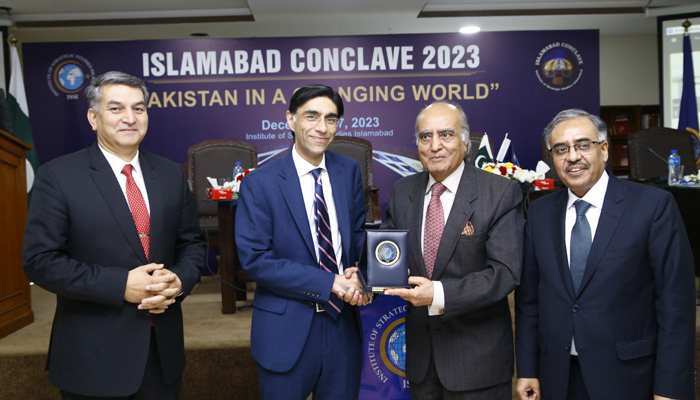‘Controlling negatives crucial for economic security’
Islamabad: Dr Moeed Yusuf, Vice-Chancellor, Beaconhouse National University (BNU), Lahore, has said that for economic security you have to identify what things you will do in the economic sphere that will benefit your overall economy by ensuring that the negatives are curtailed.
Dr Moeed was delivering keynote address on “Navigating complex geopolitics: accentuating pivot to geo-economics” at Islamabad Conclave organised here by Institute of Strategic Studies (ISS).
Dr Moeed said that success of any consensual framework depends on implementation but we are still debating on how to move forward. He stated that the real question regarding geo-economics is on how to move forward. He noted that there is a misconception of what “geo-economics” is as far as Pakistan is concerned.
He said geo-economics in post-cold war became a Machiavellian concept in western world. However, Pakistan adopted a “cooperative geo-economics” framework. Summing up, he said, that we should debate the solutions and problems through geo-economics framework to start working towards our key goals rather than debating if it is good or bad.
Dr Rabia Akhtar, Dean Faculty of Social Sciences, University of Lahore, spoke on operationalising pivot to geo-economics outlining essential pre-requisites that include most importantly political stability in the country followed by rule of law, controlling corruption, macroeconomic stability, diversification of economy promoting public private partnerships and social security. In order to achieve this, we need to collectively acknowledge what needs to be done and then do the needful, she exhorted.
Masood Khalid, former Ambassador to China, said that the Belt and Road Initiative (BRI) is the reincarnation of Chinese philosophical approach of win-win cooperation and peaceful coexistence. Through BRI, China is also helping other economies. CPEC is aligned with China's neighbourhood policy. Where China survives and thrives and the foundation of its stability, development and prosperity lies is its neighbourhood.
Dr Zhang Jiegen of Fudan University stated that if we look back at history, Pakistan adopted the right approach towards geo-economics which had been adopted by China as well during 1970s and early 1980s. The first important point for achieving such a vision for geo-economics is national consensus. The National Security Policy document reflected that all national leaders agreed to this new concept of geo-economics. The policy is an evolving document, and it helps build consensus within the country, he observed.
Naghmana Hashmi, former ambassador to China, said CPEC is an enabler for promoting internal connectivity and Pakistan should adopt a clear tourism policy that provides the sector a status of industry and tax holidays should be given to promote the sector.
-
 Patriots' WAGs Slam Cardi B Amid Plans For Super Bowl Party: She Is 'attention-seeker'
Patriots' WAGs Slam Cardi B Amid Plans For Super Bowl Party: She Is 'attention-seeker' -
 Martha Stewart On Surviving Rigorous Times Amid Upcoming Memoir Release
Martha Stewart On Surviving Rigorous Times Amid Upcoming Memoir Release -
 Prince Harry Seen As Crucial To Monarchy’s Future Amid Andrew, Fergie Scandal
Prince Harry Seen As Crucial To Monarchy’s Future Amid Andrew, Fergie Scandal -
 Chris Robinson Spills The Beans On His, Kate Hudson's Son's Career Ambitions
Chris Robinson Spills The Beans On His, Kate Hudson's Son's Career Ambitions -
 18-month Old On Life-saving Medication Returned To ICE Detention
18-month Old On Life-saving Medication Returned To ICE Detention -
 Major Hollywood Stars Descend On 2026 Super Bowl's Exclusive Party
Major Hollywood Stars Descend On 2026 Super Bowl's Exclusive Party -
 Cardi B Says THIS About Bad Bunny's Grammy Statement
Cardi B Says THIS About Bad Bunny's Grammy Statement -
 Sarah Ferguson's Silence A 'weakness Or Strategy'
Sarah Ferguson's Silence A 'weakness Or Strategy' -
 Garrett Morris Raves About His '2 Broke Girls' Co-star Jennifer Coolidge
Garrett Morris Raves About His '2 Broke Girls' Co-star Jennifer Coolidge -
 Winter Olympics 2026: When & Where To Watch The Iconic Ice Dance ?
Winter Olympics 2026: When & Where To Watch The Iconic Ice Dance ? -
 Melissa Joan Hart Reflects On Social Challenges As A Child Actor
Melissa Joan Hart Reflects On Social Challenges As A Child Actor -
 'Gossip Girl' Star Reveals Why She'll Never Return To Acting
'Gossip Girl' Star Reveals Why She'll Never Return To Acting -
 Chicago Child, 8, Dead After 'months Of Abuse, Starvation', Two Arrested
Chicago Child, 8, Dead After 'months Of Abuse, Starvation', Two Arrested -
 Travis Kelce's True Feelings About Taylor Swift's Pal Ryan Reynolds Revealed
Travis Kelce's True Feelings About Taylor Swift's Pal Ryan Reynolds Revealed -
 Michael Keaton Recalls Working With Catherine O'Hara In 'Beetlejuice'
Michael Keaton Recalls Working With Catherine O'Hara In 'Beetlejuice' -
 King Charles, Princess Anne, Prince Edward Still Shield Andrew From Police
King Charles, Princess Anne, Prince Edward Still Shield Andrew From Police




